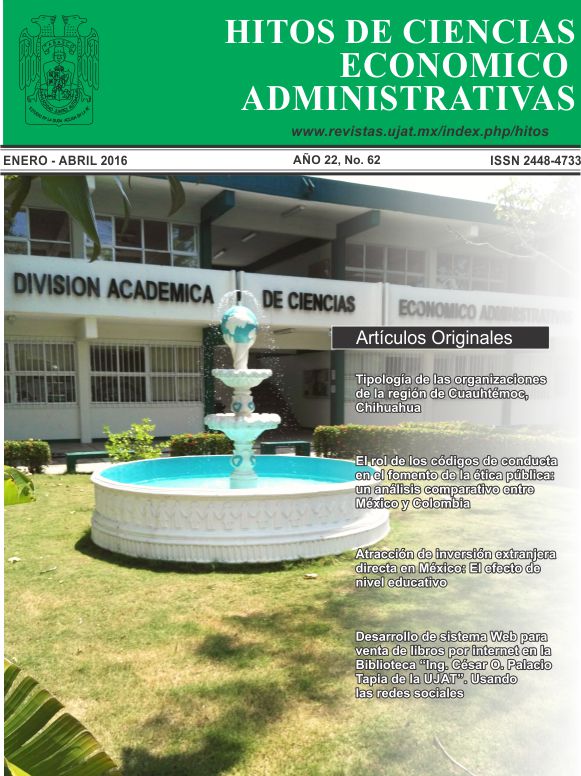ATRACCIÓN DE INVERSIÓN EXTRANJERA DIRECTA EN MÉXICO: EL EFECTO DEL NIVEL EDUCATIVO
DOI:
https://doi.org/10.19136/hitos.a0n62.1743Abstract
RESUMEN Objetivo: Conocer cómo afecta el nivel educativo a la atracción de Inversión Extranjera Directa, dadas las demás variables independientes de control que explican la IED. Material y método: Esta investigación es cuantitativa, experimental de serie cronológica, debido a que se analizarán las observaciones de cada una de las variables durante un periodo de tiempo, que comprende desde 1994 a 2013. Todos los datos obtenidos de las variables serán a nivel nacional. Tomando en cuenta los factores que inciden en el entorno nacional que pueden tener efecto sobre las decisiones de inversión de otros países hacia México, como: el ambiente económico, la infraestructura de transporte y de telecomunicaciones y la seguridad pública. Resultados: Con base en los resultados, un mayor nivel educativo afecta negativamente la inversión extranjera directa. A mayor graduados de un nivel educativo superior, menos inversión extranjera directa; debido a que las empresas multinacionales requieren una mayor cantidad de mano de obra con pocas habilidades y formación. ABSTRACT Objetive: Know how educational level affects to foreign direct investment attraction, given others independent control variables that explains FDI. Material and method: This research is quantitative, experimental and time’s series, due to the observation are analyzed for a time period which ranges from 1994 to 2013. All data were obtained from nationwide variables. Based on factors that influence in national environment and may have effect on investment decisions from other countries towards Mexico as: economic environment, transportation and telecommunication infraestructure and public security. Results: Based on the outcomes, a higher education level affects in a negative way foreign direct investment. To more graduates from higher education level, less foreign direct investment, due to multinational companies require a greater number of labor force with few skills and formation.Downloads
Downloads
Published
Issue
Section
License
As a requirement for the manuscript, the author is requested to provide the Copyright Assignment Letter, so that the Journal has the publication rights and to avoid plagiarism.
PLAGIARISM POLICIES
The Editorial Board of the Journal HITOS DE CIENCIAS ECONÓMICO ADMINISTRAIVAS has the authority to reject in the review process any manuscript that does not have adequate citation in the documents consulted in its scientific research work, which can be considered as plagiarism behaviors. Likewise, the referees carry out the plagiarism review using specialized software, such as iThenticate, among others.
COPYRIGHT POLICIES
Authors who have publications in the journal accept the following terms: • At the time the manuscript is accepted, the author transfers the copyright to the Journal HITOS DE CIENCIAS ECONÓMICO ADMINISTRATIVAS.
- The authors may make additional agreements for non-exclusive distribution of the published version of the article (e.g., including it in an institutional repository or publishing it in a book) provided that the initial publication in this journal is indicated.
- Authors are allowed and recommended to publish their research work on the Internet (eg, institutional or personal files), which would allow more beneficial exchanges to increase the citation of the published work.
This work is licensed under Creative Commons Attribution-NonCommercial-NoDerivatives 4.0 International





